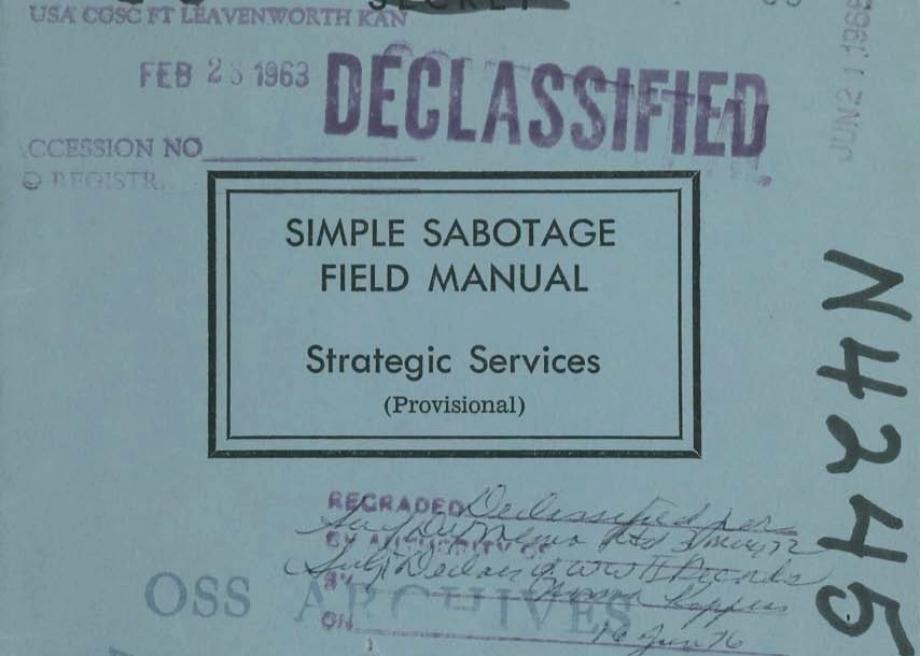Read the CIA’s Simple Sabotage Field Manual: A Timeless Guide to Subverting Any Organization with “Purposeful Stupidity” (1944)

I’ve always admired people who can successfully navigate what I refer to as “Kafka’s Castle,” a term of dread for the many government and corporate agencies that have an inordinate amount of power over our permanent records, and that seem as inscrutable and chillingly absurd as the labyrinth the character K navigates in Kafka’s last allegorical novel. Even if you haven’t read The Castle, if you work for such an entity—or like all of us have regular dealings with the IRS, the healthcare and banking system, etc.—you’re well aware of the devilish incompetence that masquerades as due diligence and ties us all in knots. Why do multi-million and billion dollar agencies seem unable, or unwilling, to accomplish the simplest of tasks? Why do so many of us spend our lives in the real-life bureaucratic nightmares satirized in the The Office and Office Space?
One answer comes via Laurence J. Peter’s 1969 satire The Peter Principle—which offers the theory that managers and executives get promoted to the level of their incompetence—then, David Brent-like, go on to ruin their respective departments. The Harvard Business Review summed up disturbing recent research confirming and supplementing Peter’s insights into the narcissism, overconfidence, or actual sociopathy of many a government and business leader. But in addition to human failings, there’s another possible reason for bureaucratic disorder; the conspiracy-minded among us may be forgiven for assuming that in many cases, institutional incompetence is the result of deliberate sabotage from both above and below. The ridiculous inner workings of most organizations certainly make a lot more sense when viewed in the light of one set of instructions for “purposeful stupidity,” namely the once top-secret Simple Sabotage Field Manual, written in 1944 by the CIA’s precursor, the Office of Strategic Services (OSS).
Now declassified and freely available on the Homeland Security website, the manual the agency describes as “surprisingly relevant” was once distributed to OSS officers abroad to assist them in training “citizen-saboteurs” in occupied countries like Norway and France. Such people, writes Rebecca Onion at Slate, “might already be sabotaging materials, machinery, or operations of their own initiative,” but may have lacked the devious talent for sowing chaos that only an intelligence agency can properly master. Genuine laziness, arrogance, and mindlessness may surely be endemic. But the Field Manual asserts that “purposeful stupidity is contrary to human nature” and requires a particular set of skills. The citizen-saboteur “frequently needs pressure, stimulation or assurance, and information and suggestions regarding feasible methods of simple sabotage.”
You can read and download the full document here. To get a sense of just how “timeless”—according to the CIA itself—such instructions remain, see the abridged list below, courtesy of Business Insider. You will laugh ruefully, then maybe shudder a little as you recognize how much your own workplace, and many others, resemble the kind of dysfunctional mess the OSS meticulously planned during World War II.
Organizations and Conferences
- Insist on doing everything through “channels.” Never permit short-cuts to be taken in order to expedite decisions.
- Make “speeches.” Talk as frequently as possible and at great length. Illustrate your “points” by long anecdotes and accounts of personal experiences.
- When possible, refer all matters to committees, for “further study and consideration.” Attempt to make the committee as large as possible — never less than five.
- Bring up irrelevant issues as frequently as possible.
- Haggle over precise wordings of communications, minutes, resolutions.
- Refer back to matters decided upon at the last meeting and attempt to re-open the question of the advisability of that decision.
- Advocate “caution.” Be “reasonable” and urge your fellow-conferees to be “reasonable” and avoid haste which might result in embarrassments or difficulties later on.
Managers
- In making work assignments, always sign out the unimportant jobs first. See that important jobs are assigned to inefficient workers.
- Insist on perfect work in relatively unimportant products; send back for refinishing those which have the least flaw.
- To lower morale and with it, production, be pleasant to inefficient workers; give them undeserved promotions.
- Hold conferences when there is more critical work to be done.
- Multiply the procedures and clearances involved in issuing instructions, pay checks, and so on. See that three people have to approve everything where one would do.
Employees
- Work slowly
- Work slowly.
- Contrive as many interruptions to your work as you can.
- Do your work poorly and blame it on bad tools, machinery, or equipment. Complain that these things are preventing you from doing your job right.
- Never pass on your skill and experience to a new or less skillful worker.
Note: This post originally appeared on our site in December 2015.
Related Content:
The CIA’s Style Manual & Writer’s Guide: 185 Pages of Tips for Writing Like a Spook
How the CIA Secretly Funded Abstract Expressionism During the Cold War
Read the CIA’s Simple Sabotage Field Manual: A Timeless Guide to Subverting Any Organization with “Purposeful Stupidity” (1944) is a post from: Open Culture. Follow us on Facebook and Twitter, or get our Daily Email. And don't miss our big collections of Free Online Courses, Free Online Movies, Free eBooks, Free Audio Books, Free Foreign Language Lessons, and MOOCs.
from Open Culture https://www.openculture.com/2022/01/read-the-cias-simple-sabotage-field-manual.html
via Ilumina
Comments
Post a Comment